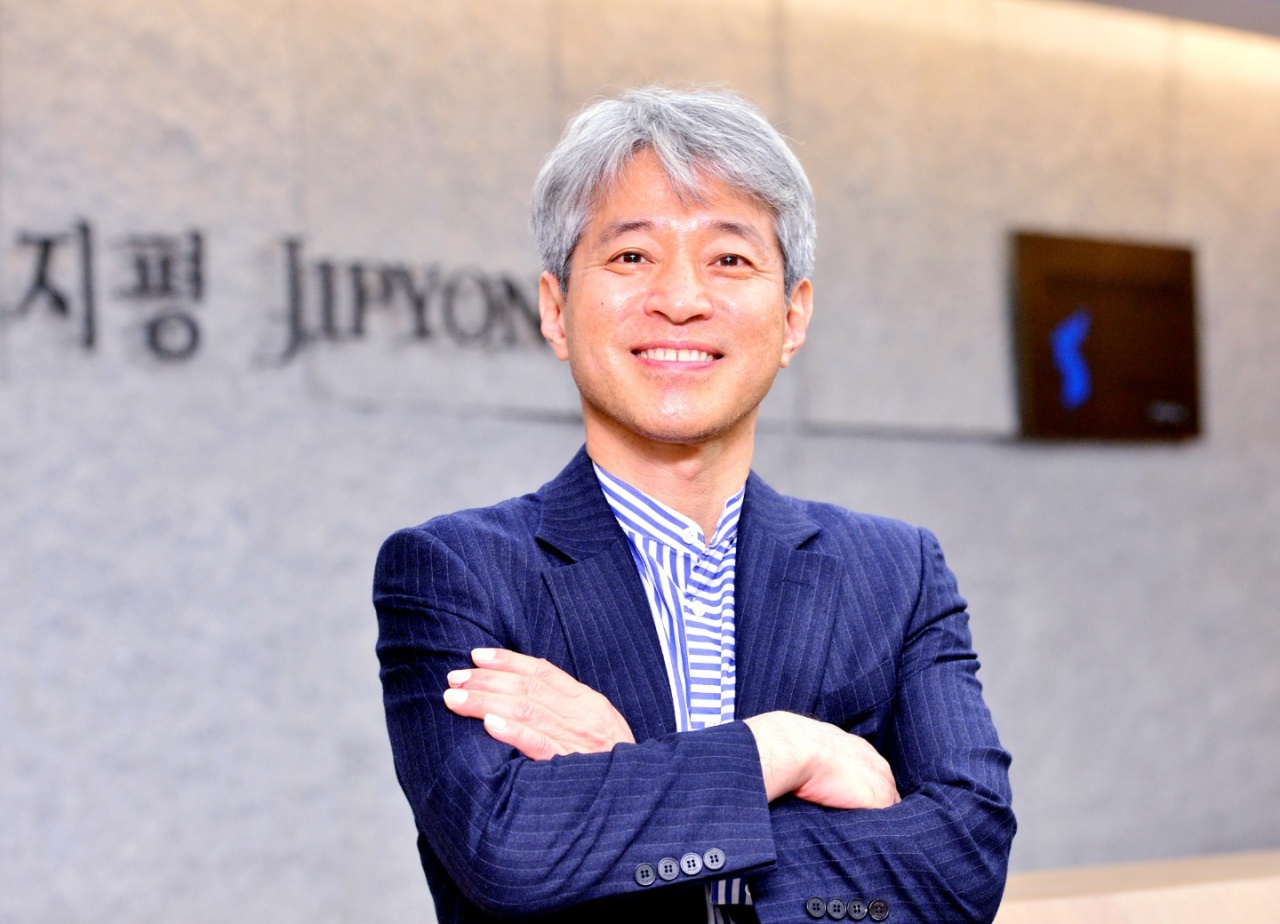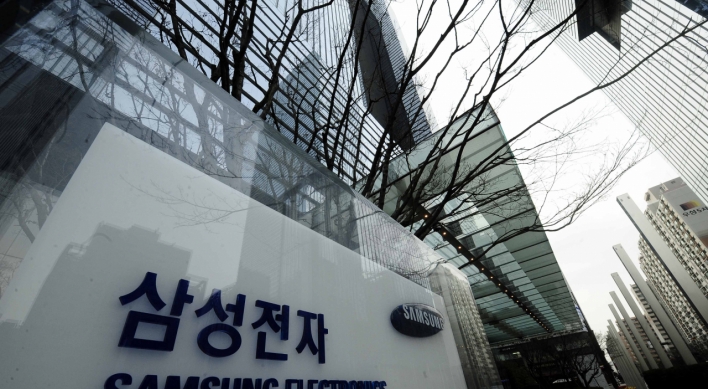[#WeFace] ‘Embrace ESG principle as incentive’
Jipyong managing partner calls ESG a blue ocean market for legal professionals
By Choi Jae-heePublished : April 12, 2021 - 17:12

The government should not set legal requirements for companies adopting environmental, social and corporate governance, or ESG, principles, but should instead provide incentives for those accepting green and ethical management practices voluntarily, a top lawyer said.
Lim Sung-taek, a managing partner at law firm Jipyong, said in an interview that excessive state-imposed restrictions regarding ESG commitments could lead to market backlash because ESG is about paradigm shifts created by market forces, especially within financial circles.
“The current ESG movement has gained momentum as global bankers and investors have increasingly implemented ESG financing and investment, which prompted companies across industries to push for ESG-based business operations,” Lim said.
In recent months, local financial players have rushed to incorporate ESG factors into their investment and operation practices. Banking giants -- Shinhan Financial, KB Financial and Woori Financial -- declared their vision of achieving carbon neutrality by 2050 and promised to halt financial support, such as project financing, for businesses threatening the environment and society.
“The financial authorities should build a regulatory environment for the ESG ecosystem with a flexible ‘negative’ approach, under which regulations specify business activities that are banned, allowing all others, while giving various incentives to companies committed to ESG standards,” he said.
Lim said authenticity was key to successful ESG activities by companies and government bodies.
“Businesses that promote their eco-friendly image without improving their environmental impact, known as ‘greenwashing,’ are likely to be weeded out of the market in the long term,” he said.
“Law firms are no exception. HSBC Korea, one of our clients, recently asked whether Jipyong LLC has been carrying out ESG activities. Just like other firms ramping up ESG efforts, law firms should be on alert over potential ESG risks by releasing periodic reports on their ESG activities.”
Amid fast-changing regional and international ESG policies, domestic law firms are accelerating efforts to help their clients manage ESG risks and opportunities. These range from ESG-dedicated teams to webinars.
“The ongoing ESG business management trend could open up a blue ocean market for legal circles as companies came under growing pressure to beef up sustainability efforts,” he said.
“To maintain footholds in global markets, local firms should navigate the plethora of ESG-related regulatory standards or campaigns, and it is law firms which can act as a catalyst for them to respond swiftly to rapid market changes.”
The European Parliament recently proposed legislation that would create a legal obligation for EU companies to undertake due diligence to assess their human rights and environmental risks, he explained. Global corporate initiatives to foster ESG values, such as RE100 or the UN Principles for Responsible Investment, have been gaining traction in South Korea, he added.
Led by the international nonprofit Climate Group, RE100, meaning renewable energy 100 percent, is a collaborative initiative by leading businesses to meet all their entire electricity needs with renewable energy by 2050. The UN PRI is a global investor initiative that promotes responsible investment by incorporating ESG factors.
Responding to the ESG boom fueled by the novel coronavirus outbreak, in September last year Jipyong set up a new division called the Jipyong ESG Center, the first of its kind in the local legal services industry.
Under Lim’s leadership, the center provides ESG management consulting services, including evaluations of a company’s impact on the environment and society and advice on ESG regulations at home and abroad, as well as on ESG reporting guidelines.
Demand for legal advice on ESG management has been on the rise since the government unveiled a policy framework in January that obligates firms listed on the benchmark Kospi with total assets valued at 2 trillion won ($1.78 billion) or more to disclose information on their ESG activities from 2025 until 2030, when the requirement will be expanded to all listed companies, according to Lim.
He said attorneys can play a crucial role in the Ministry of Environment’s drive to create a classification system called K-taxonomy by the end of the first quarter, which will provide a list of environmentally sustainable economic activities to help investors understand whether an economic activity is consistent with ESG values.
“Currently, researchers at nonprofit corporations that carry out ESG evaluation, like the Korea Corporate Governance Service, and renowned management professors are taking part in the government-led process to lay the groundwork for ESG evaluation,” Lim said.
“With long-standing experience of legal advisory services in nonfinancial areas, including environment, labor, safety, health and business structure, attorneys have certain advantages over other researchers when doing ESG-related projects with the government. The EU, for instance, partnered with attorneys to develop its ESG taxonomy.
Lim, 57, joined Jipyong as a founding member in 2000. With more than 20 years of legal experience, he has voiced support for ESG management.
Jipyong LCC has been at the forefront of the ESG drive in the legal services sector, having launched the first human rights management team in the industry in 2019.
By Choi Jae-hee (cjh@heraldcorp.com)
Lim Sung-taek, a managing partner at law firm Jipyong, said in an interview that excessive state-imposed restrictions regarding ESG commitments could lead to market backlash because ESG is about paradigm shifts created by market forces, especially within financial circles.
“The current ESG movement has gained momentum as global bankers and investors have increasingly implemented ESG financing and investment, which prompted companies across industries to push for ESG-based business operations,” Lim said.
In recent months, local financial players have rushed to incorporate ESG factors into their investment and operation practices. Banking giants -- Shinhan Financial, KB Financial and Woori Financial -- declared their vision of achieving carbon neutrality by 2050 and promised to halt financial support, such as project financing, for businesses threatening the environment and society.
“The financial authorities should build a regulatory environment for the ESG ecosystem with a flexible ‘negative’ approach, under which regulations specify business activities that are banned, allowing all others, while giving various incentives to companies committed to ESG standards,” he said.
Lim said authenticity was key to successful ESG activities by companies and government bodies.
“Businesses that promote their eco-friendly image without improving their environmental impact, known as ‘greenwashing,’ are likely to be weeded out of the market in the long term,” he said.
“Law firms are no exception. HSBC Korea, one of our clients, recently asked whether Jipyong LLC has been carrying out ESG activities. Just like other firms ramping up ESG efforts, law firms should be on alert over potential ESG risks by releasing periodic reports on their ESG activities.”
Amid fast-changing regional and international ESG policies, domestic law firms are accelerating efforts to help their clients manage ESG risks and opportunities. These range from ESG-dedicated teams to webinars.
“The ongoing ESG business management trend could open up a blue ocean market for legal circles as companies came under growing pressure to beef up sustainability efforts,” he said.
“To maintain footholds in global markets, local firms should navigate the plethora of ESG-related regulatory standards or campaigns, and it is law firms which can act as a catalyst for them to respond swiftly to rapid market changes.”
The European Parliament recently proposed legislation that would create a legal obligation for EU companies to undertake due diligence to assess their human rights and environmental risks, he explained. Global corporate initiatives to foster ESG values, such as RE100 or the UN Principles for Responsible Investment, have been gaining traction in South Korea, he added.
Led by the international nonprofit Climate Group, RE100, meaning renewable energy 100 percent, is a collaborative initiative by leading businesses to meet all their entire electricity needs with renewable energy by 2050. The UN PRI is a global investor initiative that promotes responsible investment by incorporating ESG factors.
Responding to the ESG boom fueled by the novel coronavirus outbreak, in September last year Jipyong set up a new division called the Jipyong ESG Center, the first of its kind in the local legal services industry.
Under Lim’s leadership, the center provides ESG management consulting services, including evaluations of a company’s impact on the environment and society and advice on ESG regulations at home and abroad, as well as on ESG reporting guidelines.
Demand for legal advice on ESG management has been on the rise since the government unveiled a policy framework in January that obligates firms listed on the benchmark Kospi with total assets valued at 2 trillion won ($1.78 billion) or more to disclose information on their ESG activities from 2025 until 2030, when the requirement will be expanded to all listed companies, according to Lim.
He said attorneys can play a crucial role in the Ministry of Environment’s drive to create a classification system called K-taxonomy by the end of the first quarter, which will provide a list of environmentally sustainable economic activities to help investors understand whether an economic activity is consistent with ESG values.
“Currently, researchers at nonprofit corporations that carry out ESG evaluation, like the Korea Corporate Governance Service, and renowned management professors are taking part in the government-led process to lay the groundwork for ESG evaluation,” Lim said.
“With long-standing experience of legal advisory services in nonfinancial areas, including environment, labor, safety, health and business structure, attorneys have certain advantages over other researchers when doing ESG-related projects with the government. The EU, for instance, partnered with attorneys to develop its ESG taxonomy.
Lim, 57, joined Jipyong as a founding member in 2000. With more than 20 years of legal experience, he has voiced support for ESG management.
Jipyong LCC has been at the forefront of the ESG drive in the legal services sector, having launched the first human rights management team in the industry in 2019.
By Choi Jae-hee (cjh@heraldcorp.com)






![[KH Explains] No more 'Michael' at Kakao Games](http://res.heraldm.com/phpwas/restmb_idxmake.php?idx=644&simg=/content/image/2024/04/28/20240428050183_0.jpg&u=20240428180321)



![[Grace Kao] Hybe vs. Ador: Inspiration, imitation and plagiarism](http://res.heraldm.com/phpwas/restmb_idxmake.php?idx=644&simg=/content/image/2024/04/28/20240428050220_0.jpg&u=)









![[Herald Interview] Xdinary Heroes shoot for the next level with 'Troubleshooting'](http://res.heraldm.com/phpwas/restmb_idxmake.php?idx=642&simg=/content/image/2024/04/29/20240429050745_0.jpg&u=)